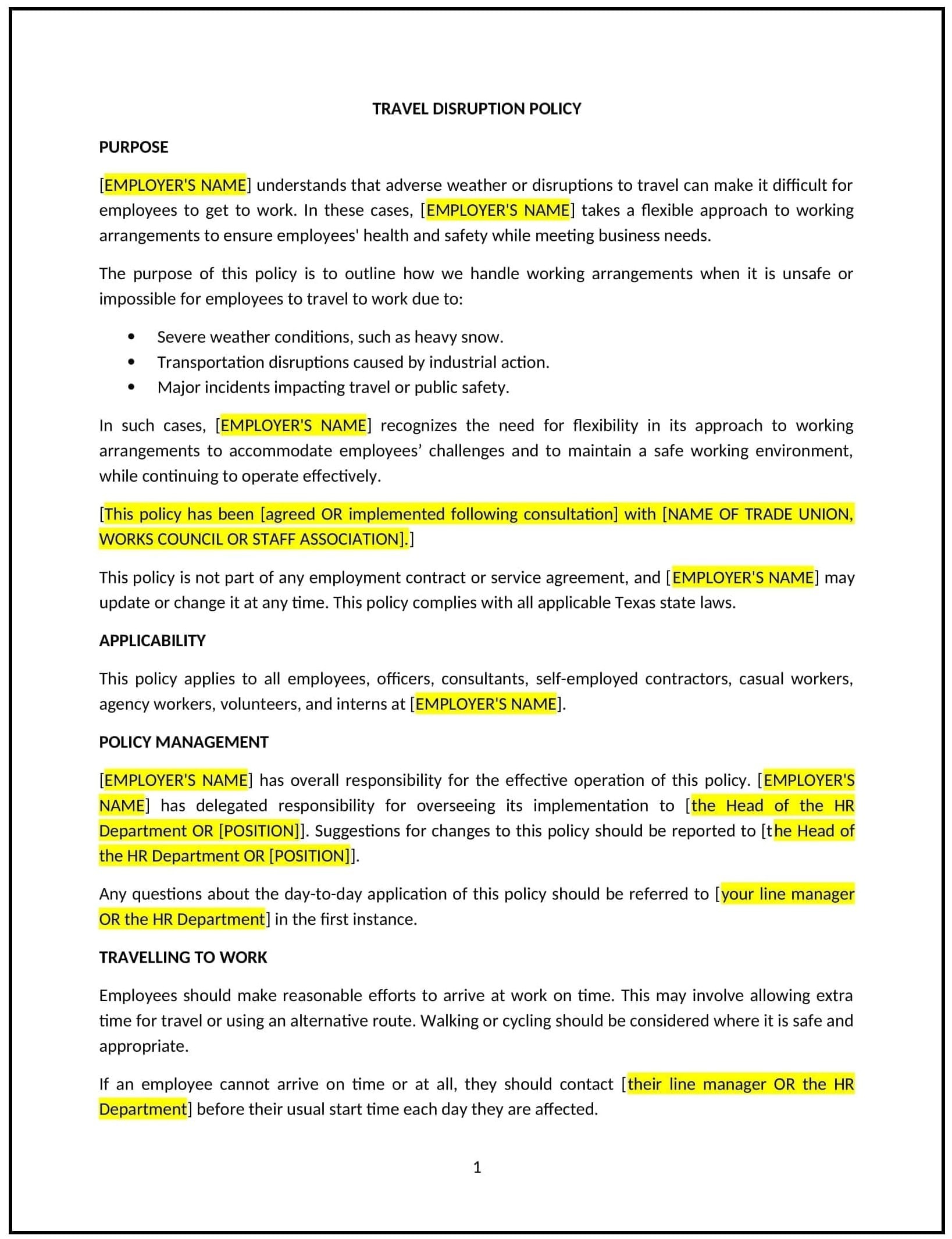Got contracts to review? While you're here for policies, let Cobrief make contract review effortless—start your free review now.

Customize this template for free
Travel disruption policy (Texas)
This travel disruption policy is designed to help Texas businesses manage situations where employees experience travel disruptions that impact their ability to attend work or business-related events. The policy outlines the procedures for addressing delays, cancellations, and other travel disruptions, as well as the company’s expectations for communication, compensation, and contingency plans.
By adopting this policy, businesses can support employees during travel disruptions, ensure continuity of operations, and minimize the negative impact of travel issues on the business.
How to use this travel disruption policy (Texas)
- Define travel disruptions: Clearly define what constitutes a travel disruption, such as flight cancellations, delays, severe weather, transportation strikes, or other unforeseen events that cause delays in an employee’s ability to reach their destination.
- Set reporting procedures: Outline the process for employees to report travel disruptions as soon as they occur. Employees should notify their supervisor or HR department and provide details about the disruption, estimated arrival times, and any alternative arrangements.
- Address flexible work arrangements: Specify how the company will handle work during travel disruptions, including whether employees can work remotely, take advantage of flexible hours, or make up lost time, depending on the nature of their job and the situation.
- Provide guidance on accommodation and expenses: Clarify whether the company will cover additional costs incurred due to travel disruptions, such as hotel stays, meals, or transportation. The policy should specify the circumstances under which employees can be reimbursed for such expenses and any spending limits.
- Outline contingency planning: Encourage employees to have contingency plans in place for travel disruptions, such as alternative travel options or accommodation bookings, to minimize the impact of delays.
- Address missed work events: If a business trip or work-related event is missed due to a travel disruption, the policy should outline how the company will handle rescheduling or finding alternative solutions.
- Ensure fair treatment: The policy should emphasize that employees will be treated fairly and respectfully in the event of travel disruptions and that they will not be penalized for situations beyond their control.
Benefits of using this travel disruption policy (Texas)
This policy offers several benefits for Texas businesses:
- Reduces employee stress: By clearly outlining expectations and procedures for handling travel disruptions, the policy helps reduce stress for employees who face unexpected travel issues, allowing them to focus on resolving the situation.
- Minimizes business impact: With a clear contingency plan, businesses can mitigate the negative effects of travel disruptions, ensuring that employees remain productive and that work or events continue without major delays.
- Promotes fairness: The policy ensures that employees are treated fairly and consistently when faced with travel disruptions, avoiding potential conflicts or misunderstandings.
- Supports business continuity: By offering flexible work arrangements or alternative solutions for employees impacted by travel disruptions, the company can maintain operations and minimize productivity loss.
- Enhances employee satisfaction: Providing support during travel disruptions can improve employee satisfaction and loyalty, showing that the company cares about its employees’ well-being and understands the challenges of business travel.
Tips for using this travel disruption policy (Texas)
- Communicate the policy clearly: Ensure that all employees who travel for business purposes are aware of the travel disruption policy, including the procedures for reporting disruptions, what expenses are covered, and how alternative work arrangements will be handled.
- Offer training or resources: Consider offering training or resources to help employees manage travel disruptions effectively, such as tips for booking flexible travel options or dealing with cancellations.
- Stay flexible: Be open to flexible work arrangements for employees who experience disruptions, especially when it’s not feasible for them to arrive at their destination on time.
- Monitor the policy’s effectiveness: Regularly assess how well the policy addresses real-world travel disruptions and make adjustments as necessary to improve the experience for both employees and the company.
- Review periodically: The policy should be reviewed regularly to ensure it remains aligned with changes in Texas state laws, business practices, or the travel industry.